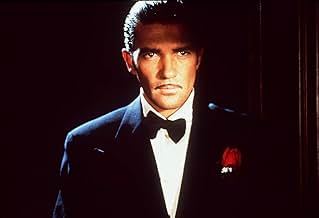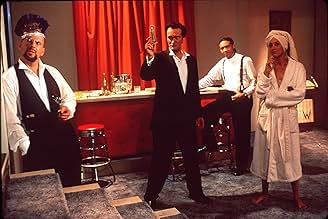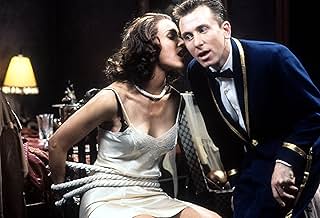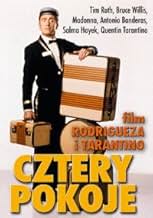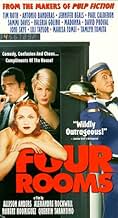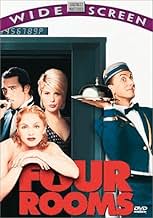Quatre histoires enchevêtrées qui se déroulent dans un hôtel en déclin la veille du jour de l'An.Quatre histoires enchevêtrées qui se déroulent dans un hôtel en déclin la veille du jour de l'An.Quatre histoires enchevêtrées qui se déroulent dans un hôtel en déclin la veille du jour de l'An.
- Récompenses
- 1 victoire et 1 nomination au total
Amanda De Cadenet
- Diana (segment "The Missing Ingredient")
- (as Amanda deCadenet)
Patricia Vonne
- Corpse (segment "The Misbehavers")
- (as Patricia Vonne Rodriguez)
Histoire
Le saviez-vous
- AnecdotesThe reason Bruce Willis is not credited is because he violated SAG rules for acting in this film for no money. He appeared for fun and as a favor to Quentin Tarantino, and acting for free violated SAG rules. SAG agreed not to sue Willis if his name was not included in the credits.
- GaffesThe hotel's vintage telephone switchboard adds an element of comic chaos, but it is not consistently used. Ted answers calls to the front desk by pushing cables into jacks, but Sarah (the little girl in "The Misbehavers") is able to dial another room directly. Also, when the partying guys call and don't know what room they are in, Ted should be able to get the room number right off the switchboard which means that Ted had no excuse to deliver the ice to the wrong room. Also near the end of the scene, Ted is shouting into the phone to send the police but this would be impossible because there was no-one on the switchboard to connect him to an external line.
- Citations
Angela: Whether you like it or not, you are in the middle of a situation here you cannot just wish your way out of.
Ted the Bellhop: But I've never met you people before! You're complete strangers!
Angela: Everybody starts out as strangers, Ted. It's where we end up that counts.
- Crédits fousBruce Willis does not apear in the credits but his hairstylist does
- Versions alternativesAs indicated in the Technical Specifications link for this page on IMDB, there are two different versions of this film: "1 hr 38 min (98 min)" and "1 hr 50 min (110 min) (workprint)". Information on the workprint is as follows: "[The] second version is in English but it is overdubbed with Russian. This makes it almost impossible to work out what is extra as the Russian is much louder than the English and therefore the English cannot be heard for the majority of the movie. I have done some research and have been told that it is impossible to remove the Russian audio. The disc also contains a deleted scene from the Spanish DVD that is an alternate take, not used in either the DVD Version or the Workprint."
- ConnexionsFeatured in Cinemania: Ypalliloi en drasei! (2009)
- Bandes originalesSentimental Journey
Written by Bud Green, Les Brown, Ben Homer
Performed by Juan García Esquivel (as Esquivel)
Courtesy of The RCA Records label of BMG Music
Commentaire à la une
It's a pity that the critics gave 'Four Rooms' as hard a time as they did back in 1995, because, for everything that can be said to be wrong with it, it really does sparkle with creativity and a desire to stand out from the rest of the crowd. And let's face it, there was enough popular talent involved, including Alison Anders, Alexandre Rockwell, Robert Rodriguez and, last but not least, Quentin Tarantino, for it to have been hailed as an instant cult classic. Instead, it was bashed into submission and retreated very quickly to the back of nearly everyone's resume. With retrospect most of this reproach was probably ill-deserved - 'Four Rooms' does have its blatant moments of weakness, but then again so do a lot of the more half-baked cookie-cutter comedies which have somehow garnered more admiration than this. On the whole it's a very unusual and interesting combination - an offbeat, frisky and strangely feel-good comedy with some sinister undertones and lots of weird, intricate little details. Consisting of four 20-minute segments, each assembled by a different director's hands, it takes us through the various happenings inside separate rooms of the same hotel on New Year's Eve, as experienced by Ted, the only bellhop still left standing for the night shift. There is the slight feeling of inconsistency in moving from one directing style to the next, and a couple of attempts to interconnect the segments are a little self-contradictory. Some of it works and some it doesn't, but the end result is an episodic anthology that, if nothing too spectacular, still proves itself to be very likable in the long run.
'The Missing Ingredient' and 'the Wrong Man' are often credited with constituting the weaker half of the film, and I can't really say I disagree. 'The Missing Ingredient' tries hard to be risqué, but falls pretty short - for a story concerning a coven of bare-breasted witches trying to extract an unwilling man's semen for use in a ritual, it's remarkably innocuous and fluffy, and the visual effects only add a layer of tackiness to boot. 'The Wrong Man' is a tad more snappy and sports some stylish direction (the shot where Sigfried grabs the ringing telephone is right-on), but is ultimately swallowed up in its frenzied editing. We can vaguely understand what's happening in this segment (if not, then Ted does drop a pretty big hint later on in the film), but it makes itself unnecessarily incoherent, with bizarre imagery that adds nothing but extra confusion (the baby flashback, anyone?). It's almost as though Alexandre Rockwell isn't sure whether he wants us to be in on the whole set-up with Sigfried and Angela, or confused and in the dark like Ted, and in the end tries to accommodate both perspectives, which doesn't really wash.
It's once we reach the second half that the true quality really starts to seep its way in, and the film suddenly becomes very rewarding. 'The Misbehaviours' is a spirited little contribution that combines a moderate dose of macabre darkness with its cartoon-like innocence. Antonio Banderas certainly hits a good spot as the no-nonsense father who appoints Ted to keep an eye on his two young children while he's out, whilst the children themselves are rebellious but not irritating, all making for a surprisingly sharp and sophisticated slice of knockabout. 'The Man from Hollywood', meanwhile, is equally brilliant - Tarantino's vibrant, well-scripted take on Roald Dahl's chilling short story, 'the Man from the South', which pits Ted in the same room as cocky Hollywood director Chester Rush (and it's always a treat to see Quentin himself tackle such a winking, self-depreciating role). It manages to be tense and enjoyable, with the usual smart direction that any Tarantino fan should be able to appreciate. Overall, there's enough vitality in these particular segments to just about redeem the shakiness of the first half.
Besides, we have Tim Roth playing our hapless protagonist throughout, and, yes, that is a lot. He proves himself to be very capable in a comic performance, bringing enough gentle magnetism to his character Ted the bellhop, through his good intentions, perseverance and various neurotic mannerisms, to get us genuinely attached to him. It is hard not to come away with the impression that all four directors had a slightly different take on Ted's disposition - he goes from being timid and impressionable to obtuse and jumpy, then highly-strung and a little devious, and finally composed and relatively rational - but Roth does well in single-handedly bridging these gaps and, with the many mishaps his character has to endure over the course of the night, ensures that all changes in temper seem understandable. He retains his good-natured lovability for the entire running time, and, for anyone who can really relate to poor Ted (like yours truly), he'll have you rooting for him to the very satisfying end.
To my knowledge, there was never any other film quite like 'Four Rooms' and, judging by just how unwelcome this one was made to feel when it arrived, there probably won't be another for quite some time. It remains an ambitious and not entirely successful little sleeper, but has a good deal going for it nonetheless, and I urge all fans of Tarantino, Rodriguez and Roth in particular not to be put off by the bad press and to give it a chance. Who knows? One day, it might just make a fresh start and find the cult audience that appreciates it yet.
'The Missing Ingredient' and 'the Wrong Man' are often credited with constituting the weaker half of the film, and I can't really say I disagree. 'The Missing Ingredient' tries hard to be risqué, but falls pretty short - for a story concerning a coven of bare-breasted witches trying to extract an unwilling man's semen for use in a ritual, it's remarkably innocuous and fluffy, and the visual effects only add a layer of tackiness to boot. 'The Wrong Man' is a tad more snappy and sports some stylish direction (the shot where Sigfried grabs the ringing telephone is right-on), but is ultimately swallowed up in its frenzied editing. We can vaguely understand what's happening in this segment (if not, then Ted does drop a pretty big hint later on in the film), but it makes itself unnecessarily incoherent, with bizarre imagery that adds nothing but extra confusion (the baby flashback, anyone?). It's almost as though Alexandre Rockwell isn't sure whether he wants us to be in on the whole set-up with Sigfried and Angela, or confused and in the dark like Ted, and in the end tries to accommodate both perspectives, which doesn't really wash.
It's once we reach the second half that the true quality really starts to seep its way in, and the film suddenly becomes very rewarding. 'The Misbehaviours' is a spirited little contribution that combines a moderate dose of macabre darkness with its cartoon-like innocence. Antonio Banderas certainly hits a good spot as the no-nonsense father who appoints Ted to keep an eye on his two young children while he's out, whilst the children themselves are rebellious but not irritating, all making for a surprisingly sharp and sophisticated slice of knockabout. 'The Man from Hollywood', meanwhile, is equally brilliant - Tarantino's vibrant, well-scripted take on Roald Dahl's chilling short story, 'the Man from the South', which pits Ted in the same room as cocky Hollywood director Chester Rush (and it's always a treat to see Quentin himself tackle such a winking, self-depreciating role). It manages to be tense and enjoyable, with the usual smart direction that any Tarantino fan should be able to appreciate. Overall, there's enough vitality in these particular segments to just about redeem the shakiness of the first half.
Besides, we have Tim Roth playing our hapless protagonist throughout, and, yes, that is a lot. He proves himself to be very capable in a comic performance, bringing enough gentle magnetism to his character Ted the bellhop, through his good intentions, perseverance and various neurotic mannerisms, to get us genuinely attached to him. It is hard not to come away with the impression that all four directors had a slightly different take on Ted's disposition - he goes from being timid and impressionable to obtuse and jumpy, then highly-strung and a little devious, and finally composed and relatively rational - but Roth does well in single-handedly bridging these gaps and, with the many mishaps his character has to endure over the course of the night, ensures that all changes in temper seem understandable. He retains his good-natured lovability for the entire running time, and, for anyone who can really relate to poor Ted (like yours truly), he'll have you rooting for him to the very satisfying end.
To my knowledge, there was never any other film quite like 'Four Rooms' and, judging by just how unwelcome this one was made to feel when it arrived, there probably won't be another for quite some time. It remains an ambitious and not entirely successful little sleeper, but has a good deal going for it nonetheless, and I urge all fans of Tarantino, Rodriguez and Roth in particular not to be put off by the bad press and to give it a chance. Who knows? One day, it might just make a fresh start and find the cult audience that appreciates it yet.
Meilleurs choix
Connectez-vous pour évaluer et suivre la liste de favoris afin de recevoir des recommandations personnalisées
- How long is Four Rooms?Alimenté par Alexa
Détails
- Date de sortie
- Pays d’origine
- Site officiel
- Langue
- Aussi connu sous le nom de
- Cuatro habitaciones
- Lieux de tournage
- Sociétés de production
- Voir plus de crédits d'entreprise sur IMDbPro
Box-office
- Budget
- 4 000 000 $US (estimé)
- Montant brut aux États-Unis et au Canada
- 4 257 354 $US
- Week-end de sortie aux États-Unis et au Canada
- 427 733 $US
- 25 déc. 1995
- Montant brut mondial
- 4 257 354 $US
Contribuer à cette page
Suggérer une modification ou ajouter du contenu manquant




